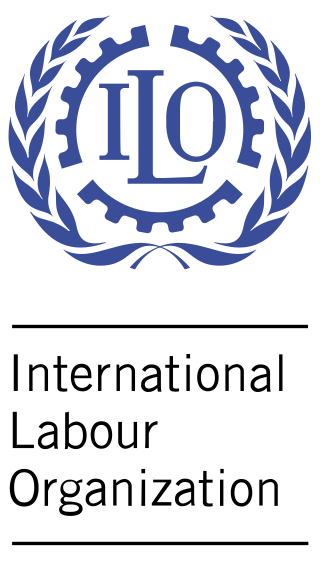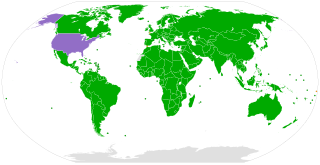
The International Labour Organization (ILO) is a United Nations agency whose mandate is to advance social and economic justice by setting international labour standards. Founded in October 1919 under the League of Nations, it is one of the first and oldest specialised agencies of the UN. The ILO has 187 member states: 186 out of 193 UN member states plus the Cook Islands. It is headquartered in Geneva, Switzerland, with around 40 field offices around the world, and employs some 3,381 staff across 107 nations, of whom 1,698 work in technical cooperation programmes and projects.
Nationality is the status of belonging to a particular nation, defined as a group of people organized in one country, under one legal jurisdiction, or as a group of people who are united on the basis of culture.

The United Nations Convention on the Rights of the Child is an international human rights treaty which sets out the civil, political, economic, social, health and cultural rights of children. The convention defines a child as any human being under the age of eighteen, unless the age of majority is attained earlier under national legislation.

Children in the military, including state armed forces, non-state armed groups, and other military organizations, may be trained for combat, assigned to support roles, such as cooks, porters/couriers, or messengers, or used for tactical advantage such as for human shields, or for political advantage in propaganda. Children have been recruited for participation in military operations and campaigns throughout history and in many cultures.

Child labour is the exploitation of children through any form of work that interferes with their ability to attend regular school, or is mentally, physically, socially and morally harmful. Such exploitation is prohibited by legislation worldwide, although these laws do not consider all work by children as child labour; exceptions include work by child artists, family duties, supervised training, and some forms of work undertaken by Amish children, as well as by Indigenous children in the Americas.

A child (pl. children) is a human being between the stages of birth and puberty, or between the developmental period of infancy and puberty. It may also refer to an unborn human being. The legal definition of child generally refers to a minor, otherwise known as a person younger than the age of majority. Children generally have fewer rights and responsibilities than adults. They are generally classed as unable to make serious decisions.
The Save the Children Fund, commonly known as Save the Children, is an international, non-government operated organization. It was founded in the UK in 1919, with the goal of helping improve the lives of children worldwide.
Children's rights or the rights of children are a subset of human rights with particular attention to the rights of special protection and care afforded to minors. The 1989 Convention on the Rights of the Child (CRC) defines a child as "any human being below the age of eighteen years, unless under the law applicable to the child, majority is attained earlier." Children's rights includes their right to association with both parents, human identity as well as the basic needs for physical protection, food, universal state-paid education, health care, and criminal laws appropriate for the age and development of the child, equal protection of the child's civil rights, and freedom from discrimination on the basis of the child's race, gender, sexual orientation, gender identity, national origin, religion, disability, color, ethnicity, or other characteristics.
Labor rights or workers' rights are both legal rights and human rights relating to labor relations between workers and employers. These rights are codified in national and international labor and employment law. In general, these rights influence working conditions in the relations of employment. One of the most prominent is the right to freedom of association, otherwise known as the right to organize. Workers organized in trade unions exercise the right to collective bargaining to improve working conditions.
Economic, social and cultural rights (ESCR) are socio-economic human rights, such as the right to education, right to housing, right to an adequate standard of living, right to health, victims' rights and the right to science and culture. Economic, social and cultural rights are recognised and protected in international and regional human rights instruments. Member states have a legal obligation to respect, protect and fulfil economic, social and cultural rights and are expected to take "progressive action" towards their fulfilment.
Peace education is the process of acquiring values, knowledge, attitudes, skills, and behaviors to live in harmony with oneself, others, and the natural environment.
Child protection refers to the safeguarding of children from violence, exploitation, abuse, and neglect. It involves identifying signs of potential harm. This includes responding to allegations or suspicions of abuse, providing support and services to protect children, and holding those who have harmed them accountable.
An international non-governmental organization (INGO) is an organization which is independent of government involvement and extends the concept of a non-governmental organization (NGO) to an international scope.

The right to education has been recognized as a human right in a number of international conventions, including the International Covenant on Economic, Social and Cultural Rights which recognizes a right to free, primary education for all, an obligation to develop secondary education accessible to all with the progressive introduction of free secondary education, as well as an obligation to develop equitable access to higher education, ideally by the progressive introduction of free higher education. In 2021, 171 states were parties to the Covenant.
Child pornography is illegal in most countries, but there is substantial variation in definitions, categories, penalties, and interpretations of laws. Differences include the definition of "child" under the laws, which can vary with the age of sexual consent; the definition of "child pornography" itself, for example on the basis of medium or degree of reality; and which actions are criminal. Laws surrounding fictional child pornography are a major source of variation between jurisdictions; some maintain distinctions in legality between real and fictive pornography depicting minors, while others regulate fictive material under general laws against child pornography.

Intersex people are individuals born with any of several sex characteristics including chromosome patterns, gonads, or genitals that, according to the Office of the United Nations High Commissioner for Human Rights, "do not fit typical binary notions of male or female bodies".
Child labour in Pakistan is the employment of children to work in Pakistan, which causes them mental, physical, moral and social harm. Child labour takes away the education from children. The Human Rights Commission of Pakistan estimated that in the 1990s, 11 million children were working in the country, half of whom were under age ten. In 1996, the median age for a child entering the work force was seven, down from eight in 1994. It was estimated that one quarter of the country's work force was made up of children. Child labor stands out as a significant issue in Pakistan, primarily driven by poverty. The prevalence of poverty in the country has compelled children to engage in labor, as it has become necessary for their families to meet their desired household income level, enabling them to afford basic necessities like butter and bread.

Slavery in international law is governed by a number of treaties, conventions and declarations. Foremost among these is the Universal Declaration on Human Rights (1948) that states in Article 4: “no one should be held in slavery or servitude, slavery in all of its forms should be eliminated.”

Basic human rights in Italy includes freedom of belief and faith, the right of asylum from undemocratic countries, the right to work, and the right of dignity and equality before the law. Human rights are the basic rights of every citizen in every country. In Italy, human rights have developed over many years and Italy has education on human rights. In addition, Italy has specific human rights for women, children and LGBT people.

During the Russo-Ukrainian War, Russia has forcibly transferred thousands of Ukrainian children to areas under its control, assigned them Russian citizenship, forcibly adopted them into Russian families, and created obstacles for their reunification with their parents and homeland. The United Nations has stated that these deportations constitute war crimes. The International Criminal Court (ICC) has issued arrest warrants for President of Russia Vladimir Putin and Children's Rights Commissioner Maria Lvova-Belova for their alleged involvement. According to international law, including the 1948 Genocide Convention, such acts constitute genocide if done with intent to destroy, in whole or in part, a nation or ethnic group.









